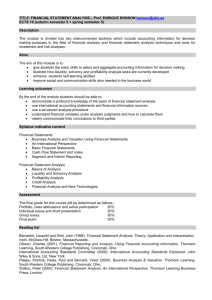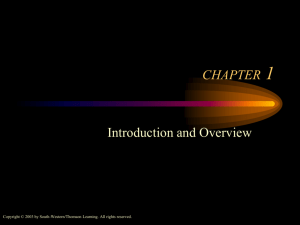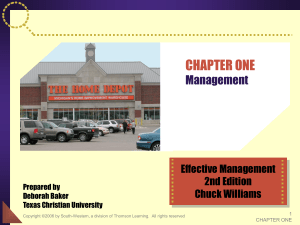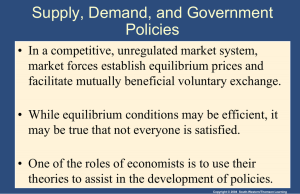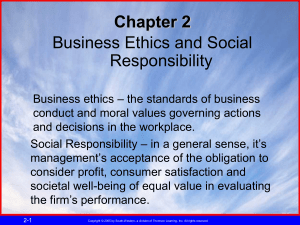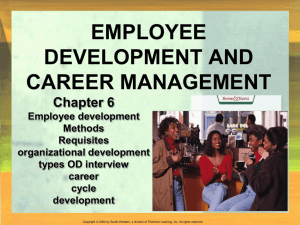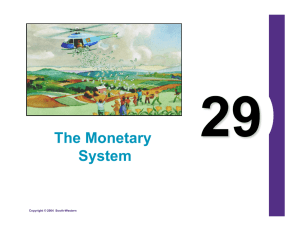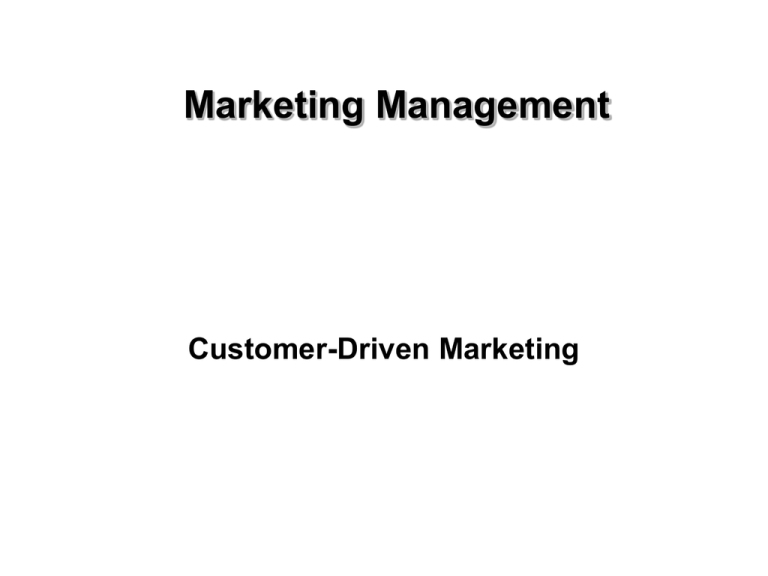
Marketing Management
Customer-Driven Marketing
1-1
Copyright © 2005 by South-Western, a division of Thomson Learning, Inc. All rights reserved.
The Marketing Mix
●
●
●
●
1-2
Product
Price
Promotion
Distribution
Copyright © 2005 by South-Western, a division of Thomson Learning, Inc. All rights reserved.
Market Share
● The percentage of sales in a market or
industry that is captured by a business.
– Units
or
– Dollars
● Examples
– Samsung had a 27% share of flat screen
TV’s in 2Q 2012
– Apple had a 12% share of PCs in 2Q 2012
– GM had 19% market share in 6/13
1-3
Copyright © 2005 by South-Western, a division of Thomson Learning, Inc. All rights reserved.
Market Research
● Reasons for Research
– Identify marketing problems and
opportunities
– Analyze competitors’ strategies
– Evaluate and predict customer behavior
– Gauge the performance of existing
products and potential for new ones
– Develop price, promotion, and distribution
plans
1-4
Copyright © 2005 by South-Western, a division of Thomson Learning, Inc. All rights reserved.
Market Research
● Obtaining Market Research
– Researchers use both internal and
external data
Internal data is generated within the
researcher’s organization
External data is gathered from sources
outside their firms
Primary Data
● The Hawthorne Effect
● How do you get ‘unobtrusive” research?
1-5
Copyright © 2005 by South-Western, a division of Thomson Learning, Inc. All rights reserved.
Marketing Research
● Computer-Based Marketing Research Systems
– Universal Product Code (UPC)—identify the
product, its manufacturer, and its price
– Marketing research firms store consumer data
and commercially available databases
● Data Mining—computer search of massive
amounts of customer data to detect pattern and
relationships.
– Data Warehouses
● Examples: grocery stores, Walmart, Anh. Bush,
Target finding pregnant women, Nordstrom
tracking customer movements
1-6
Copyright © 2005 by South-Western, a division of Thomson Learning, Inc. All rights reserved.
Market Segmentation
● Market Segmentation—process of dividing a total
market into several relatively homogeneous groups.
● E.g Don’t target all jean wearers, pick a subset
– Guinness does not target all beer drinkers
– Ferrari does not target all car buyers
– Patagonia does not target all clothes buyers
1-7
Copyright © 2005 by South-Western, a division of Thomson Learning, Inc. All rights reserved.
Methods of Segmenting Consumer Markets
1-8
Copyright © 2005 by South-Western, a division of Thomson Learning, Inc. All rights reserved.
Buyer Behavior: Determining What
Customers Want
● Buyer is not always the consumer
(The person who makes it doesn’t use it; the person
who buys it doesn’t need it; the person who uses it
doesn’t see it. It is found in a home but not a house.
What is it?)
● Other examples of the buyer not being the
consumer?
1-9
Copyright © 2005 by South-Western, a division of Thomson Learning, Inc. All rights reserved.
Steps in the Consumer Behavior Process
One job of marketing is to move customers through the
steps.
1-10
Copyright © 2005 by South-Western, a division of Thomson Learning, Inc. All rights reserved.
Creating, Maintaining, and
Strengthening Marketing
Relationships
● Tools for Nurturing Customer Relationships
– Frequency Marketing and Affinity Programs
Frequency Marketing—program that rewards
purchases with cash, rebates, merchandise, or
other premiums
Affinity Program—marketing effort sponsored by
an organization solicits involvement by individuals
who share common interest and activities
● Can you give examples?
1-11
Copyright © 2005 by South-Western, a division of Thomson Learning, Inc. All rights reserved.
Creating, Maintaining, and
Strengthening Marketing
Relationships
● Tools for Nurturing Customer Relationships
– Co-marketing - two businesses jointly market each
other’s products
– Co-branding - two or more businesses closely link
their names for a single product
– One-on-One Marketing - customized product offering
to individual needs and rapidly deliver good and
services to customers.
● Can you give examples?
1-12
Copyright © 2005 by South-Western, a division of Thomson Learning, Inc. All rights reserved.
Discussion
● Market research
– Hawthorne Effect
– How can you do ‘undetected’ research?
examples: museums, radio stations,
grocery stores
● How would you do market research for:
a bank, post office, auto repair
● How would you do relationship marketing for:
a bank, post office, auto repair, cereal,
pharmacy, college fund, Brooklyn Nets
1-13
Copyright © 2005 by South-Western, a division of Thomson Learning, Inc. All rights reserved.

